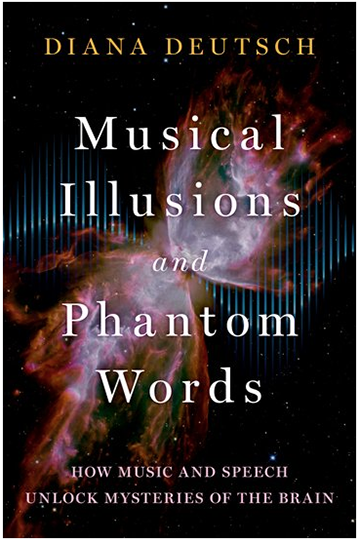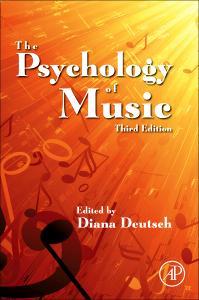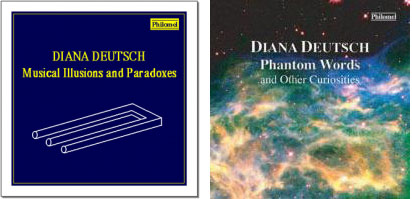| |
  |
|
 |
Diana Deutsch is Emeritus Professor in the Psychology Department at the University of California, San Diego, and Adjunct Professor at the Center for Computer Research in Music and Acoustics, in the Music Department at Stanford University. She is internationally known for the musical illusions and paradoxes that she discovered; these include the octave illusion, the scale illusion, the glissando illusion, the tritone paradox, the cambiata illusion, the phantom words illusion and the speech-to-song illusion, among others. She also explores memory for music, and how we relate the sounds of music and speech to each other. In addition she studies absolute pitch - why some people possess it, and why it is so rare.
Deutsch has over 200 publications, including Musical Illusions and Phantom Words: How Music and Speech Unlock Mysteries of the Brain (2019), The Psychology of Music, (1st edition, 1982; 2nd edition (1999), 3rd edition (2013) and the compact discs Musical Illusions and Paradoxes (1995) and Phantom Words and Other Curiosities (2003). She has been elected a Fellow of the American Association for the Advancement of Science, the Acoustical Society of America, the Audio Engineering Society, the Society of Experimental Psychologists, the American Psychological Society (renamed the Association for Psychological Science), and the American Psychological Association. She received the Rudolf Arnheim Award for Outstanding Achievement in Psychology and the Arts from the American Psychological Association, the Gustav Theodor Fechner Award for Outstanding Contributions to Empirical Aesthetics from the International Association of Empirical Aesthetics, the Science Writing Award for Professionals in Acoustics from the Acoustical Society of America, and the Gold Medal Award from the Audio Engineering Society for “lifelong contributions to the understanding of the human hearing mechanism and the science of psychoacoustics.”
Read longer Biography >
|
Musical Illusions and Phantom Words
|
|
 |
In this ground-breaking synthesis of art and science, Diana Deutsch, one of the world's leading experts on the psychology of music, shows how illusions of music and speech--many of which she herself discovered--have fundamentally altered thinking about the brain. These astonishing illusions show that people can differ strikingly in how they hear musical patterns--differences that reflect variations in brain organization as well as influences of language on music perception. Drawing on a wide variety of fields, including psychology, music theory, linguistics, and neuroscience, Deutsch examines questions such as: When an orchestra performs a symphony, what is the "real" music? Is it in the mind of the composer, or the conductor, or different members of the audience? Deutsch also explores extremes of musical ability, and other surprising responses to music and speech. Why is perfect pitch so rare? Why do some people hallucinate music or speech? Why do we hear phantom words and phrases? Why are we subject to stuck tunes, or "earworms"? Why do we hear a spoken phrase as sung just because it is presented repeatedly? In evaluating these questions, she also shows how music and speech are intertwined, and argues that they stem from an early form of communication that had elements of both. Many of the illusions described in the book are so striking and paradoxical that you need to hear them to believe them. The book enables you to listen to the sounds that are described while reading about them.
More >
|
Psychology of Music
|
Compact Discs
|
 |
 |
|
"So the attributes of The Psychology of Music are thoroughness, authority and clarity. That one volume can so adeptly select, draw on, arrange, assess, amplify its material and invite the reader to draw meaningful and reliable conclusions relevant to his/her love of music is a huge achievement. That the book does so with apposite and well-adduced illustrations while at the same time blending technical and specialist accuracy with accessibility is remarkable..."
- from review by Mark Sealey
|
"These two CDs are absolutely mind-boggling. Diana is, in effect, hosting a magical mystery tour of your own brain, and believe me, it's quite a ride."
- from review by Ian Rowland. More praise for the CDs
|

| |
|